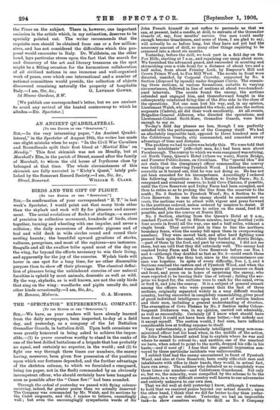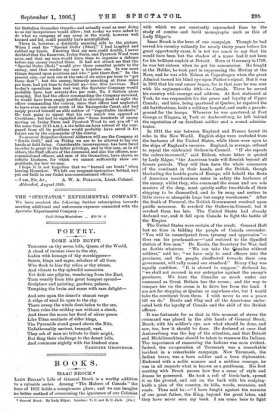THE " SPECTATOR " EXPERIMENTAL COMPANY.
[To THE EDITOR OF THE "SPECTATOR."]
Sra,—We have, as your readers will have already learned from the daily newspapers, been inspected, to-day at a field day, and yesterday, as a company of the 1st Battalion Grenadier Guards, in battalion drill. Upon both occasions we were greatly honoured in being asked to achieve the impos- sible,—(1) to prove ourselves worthy to stand in the ranks of one of the best drilled battalions of a brigade that has probably no equal, and certainly no superior, in the world ; and (2) to fight our way through three times our numbers, the enemy having, moreover, been given free possession of the positions upon which our fortunes depended, and the further advantage of the skeleton column, to which we furnished a rearguard, being (on paper, not in the flesh) commanded by an obviously incompetent officer, who should certainly have been banged as soon as possible after the "Cease fire!" had been sounded.
Through the ordeal of yesterday we passed with flying colours, receiving, indeed, far greater praise than we actually deserved. The Company was commanded by Mr. Walsh, and its sections by the Cadet sergeants, and did, I rejoice to believe, exceedingly well ; but even the encouragingly sympathetic words of Sir John French himself do not suffice to persuade us that we can, at present, hold a candle, at drill, to recruits of the Grenadier Guards of, say, four months' service. Our men could easily enough become Guardsmen, and some of them, I am glad to say, will actually be so before long, but they have not yet had the necessary amount of drill, so many other things requiring to be crammed into a short six months.
Yesterday, before the drill, we took part in a field day on the Fox Hills, starting at 7 a.m., and regaining our camp about noon.
We furnished the advanced guard, and succeeded in scouting and skirmishing over a wide front for a distance of about two and a
half miles, from about Frimley Lock, by Emperor's Hill and Crown Prince Wood, to Fox Hill West. The scouts in front were directed, unaided, by Corporal Crowsby, supported by No. 4
Section (disposed by squads) under Sergeant Currie. The remain- ing three sections, in various formations, suitable to varying circumstances, followed in line of sections at about two-hundred- yard intervals. The scouts found the enemy, the sections extended and engaged him, and thenceforward fought in the subsequently reinforced firing-line of the Blue side to tho close of the operations. Not one man lost his way, and, in my opinion, Lieutenant Walsh, who commanded the whole, and also the section sergeants (Cadets), all did their work excellently. At all events, Brigadier-General Alderson, who directed the operations, and Lieutenant-Colonel Scott-Kerr, Grenadier Guards, were kind enough to say so.
To-day's field day pleases me less, though I am perfectly satisfied with the performances of the Company itself. We bad an absolutely impossible task, opposed to three hundred men of the Coldstream Guards, ably commanded, and conceded every advantage of time and distance.
The problem we had to solve was briefly this. We were told that "armed inhabitants" (rifle-club men, &c.) had been seen about Farnborough. The convoy to which we were rearguard was retiring, via North Camp, Queen's Hotel (where we were), Norris Bridge, and Forester Public-house, on Crookham. The "special idea" did not state that the (imaginary) officer commanding the convoy was holding or observing Pyestock Wood. I therefore assumed, correctly as it turned out, that he was not doing so. He has not yet been executed for his incompetence. Accordingly I ordered the following disposition : No. 1 Section to Iveley Farm ; No. 2, rearguard and eventual reserve, to hold Cove Plateau, if possible, until the Cove Reservoir and Iveley Farm had been occupied, and then to retire so as to prolong the line from the reservoir to the south ; No. 3 Section to Pyestock Wood ; No. 4 Section to the Cove Reservoir. In case the enemy should be encountered en route, the sections were to attack with vigour and press forward to the positions ordered, unless ordered by umpires to desist. If overwhelmed, the sections were to retire on the canal, ford it if possible, and join the convoy at Norris Hill.
No. 3 Section, starting from the Queen's Hotel at 9 a.m., reached Pyestock Wood in fifteen minutes, having doubled (with four scouts in front) all the way, one and a half miles, without a single break. They arrived just in time to line the northern boundary fence, when the enemy fell upon them in overpowering numbers. They were moved back, and after hard fighting were pressed back upon the canal, which they forded at Norris Bridge, —part of them by the ford, and part by swimming. I did not see them, but am told that they did extremely well. The enemy had reached Iveley Farm and the Cove Reservoir before our Nos. 1 and 4—although they doubled as fast as No. 3—could reach those places. The fight was thus lost, since in the circumstances our case was hopeless. In spite of every difficulty, Nos. 1, 2, and 4 Sections reached the eastern end of Pyestock Wood, and when the "Cease fire !" sounded were about to ignore all pressure on flank and front, and press on in hopes of surprising the enemy, who were reported to be barring their line of retreat ; failing the sur- prise we hoped for, the sections were to rush for the canal, swim or ford it, and join the convoy. It is a subject of general remark among the officers who were present that the fact of three sections, originally separated widely in a very difficult wooded country, having succeeded in completely reassembling, gives proof of great individual intelligence upon the part of section leaders and their men, including a general understanding of direction. The evacuation of Cove Plateau by No. 2 Section under Colour- Sergeant Dickerson was, in my opinion, carried out admirably, as well as successfully. Certainly (if I know what should have been done) it could not have been done better,—but nobody saw it except myself. The section would, I feel sure, have inflicted considerable loss at trifling expense to itself.
Very unfortunately, a particularly intelligent young non-com- missioned officer lost his head when, in the middle of the action, Sir John French himself asked him to explain where he was and where he meant to retreat to; and another, one of the smartest we have, when asked to point to the north, dropped his rifle in his haste,—and it went off! I fear that the general impression eon- veyed by these particular incidents was unfavourable.
I submit that bad the enemy encountered in front of Pyestock Wood, and also at Cove Reservoir, been really rifle-club men and inhabitants with rifles in their hands, they would, in actual fact, have run away. The soldiers who defeated us so completely were three times our number—and Coldstream Guardsmen. Not only so, but we, the minority, were compelled by the scheme to be the assailants, in a very difficult country well known to our adversaries and entirely unknown to our own men.
That we did well at drill yesterday I know, although I venture to bold that we received praise beyond our actual deserts ; upon the other hand, I think that we did far better to-day than yester- day,—in spite of our defeat. Yesterday we had an impossible task—to show ourselves worthy to drill as No. 8 Company let Battalion Grenadier Guards—and actually went as near doing so as our inexperience would allow ; but to-day we were asked to do what no company a any army in the world, however well trained and led, could possibly have accomplished. There is, however, a distinctly amusing side to the picture. When I read the "Special Order (Blue)," I had laughed and rubbed my hands. Knowing that my men could double I never doubted that the Reservoir, Iveley Farm, and Pyest,ock Wood were mine, and that my men would have time to organise a defence before any enemy reached them. It had not struck me that the " Special Order (Red)" would give these essential points to the enemy, and thus render my case a hopeless one. In war most things depend upon positions and who "gets there first." In the present ease, our men ran at the rate of six miles per hour to "get there first" but the enemy, leisurely marching at three miles per hour, had yet time to forestall us,—hinc illae lacrimae. Had to-day's operations been real war, the Spectator Company would probably have lost seventy-five per cent., No. 3 Section alone escaping. But had the officer commanding the Company survived, he would have been amply justified in shooting dead at sight the officer commanding the convoy, since that officer had neglected to leave even one scout north of the Basingstoke Canal, and had amply proved himself an able author of "regrettable incidents." He took pains to signal that his own march was opposed at Crookham ; but had he signalled also "Some hundreds of enemy moving on Iveley Farm and Pyestock Wood to cut you off" at the same time (9.15 a.m.), a six-miles-an-hour retreat of the rear- guard from all its positiOns would probably have saved it for future use by the commander of the convoy.
To-morrow Brigadier-General Alderson will see the Company at "Battle Drill," and on Friday we are to be allowed to try our hands at field firing. Considerable inconvenience has been faced in order to grant us the latter privilege, and in this case, as in all others, the Staff officers of the command, and also the officers, non- commissioned officers, and men of the Grenadiers, have shown us infinite kindness, for which we cannot sufficiently show our gratitude, try how we may. I hope it is not forgotten that we "burned our boats" when leaving Hounslow. We left our sergeant-instructors behind, and put our faith in our Cadet non-commissioned officers.
—I am, Sir, &c, A. W. A. POLLOCK, Lieut.-Colonel.
Aldershot, August 29th.



































 Previous page
Previous page